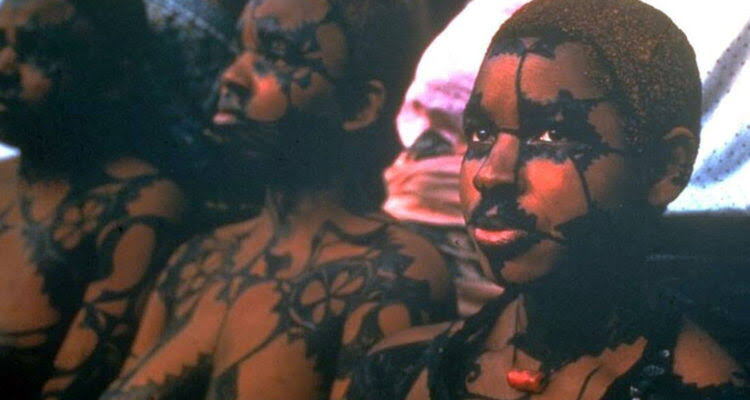by Ifeoluwa Olutayo
For as long as I can remember, there’s always been a revisiting attitude about what a shift in our culture and traditions would bring to the table.
There has been a constant jousting between members of the fourth estate, positing, speculating, inferring and postulating about the loss of self and the decline of cultural identity.
Well, that conversation is broached and given a varying perspective in the incredibly deft work of Ngozi Onwurah, Monday’s Girls.
This 50-minute documentary follows the intimacies of the Iria initiation ceremony in a small village in the Niger Delta. For this village, it represents a rite of passage for girls to become women, a tradition that according to a participating community member has existed for hundreds of years.
The Iriabos (the name for the girls going through the ceremony) are declared fit for marriage and motherhood at the end of the initiation period.
It’s a story that touches on all the details of this rite, following two iriabos as they navigate this tradition. Florence, the granddaughter of the woman in charge of the ceremony, views the ceremony as an honour for her and her family and embraces all that is required of her for the duration of the initiation ritual. Asikiye on the other hand, a music student who returned from Port Harcourt to engage in the ritual for the benefit of her father, rebels against some of the requirements of the ritual, traditions she feels are humiliating and better left behind.
There’s a curiosity in this, with Ngozi trying to make sense of her Nigerian half, even if the traditions are not hers and she doesn’t agree with them. To be fair, this was commissioned by the BBC, so there’s impartiality at play, a need to show things as they are, but with Asikiye, she possibly leans on Character to show her distaste.
She also relies on all women’s voices to tell the audience the story of the ceremony. Excitement, disgust and culpability are all expressed through women and I for one, like that.
Off the bat, the contrast between Florence and Asikiye helps push the age-long conversation into view, the one of tradition vs modernity. Asikiye is representative of a world outside of the small village moving away from such practices and she brings that dissension to the fore when she is asked to do things the village committee for the ritual already agreed to leave out in her case. These concessions draw attention to the power imbalance of it all, Asikiye’s father being a chief and a wealthy man in the community.
Asikiye leaves because she can, a freedom that is not available to the other iriabos (though this choice is costly, with her father no longer speaking to her).
This brings shame and disgrace to her family, but she is miles away. The other iriabos have known nothing but this village and if they “fail” as Asikiye has, they are trapped there enduring all of that disgrace, never to emerge women (as defined by their village).
The girls are expected to shave their heads and bare their breasts for inspection at the town square, a way for Moses Monday, the head of the ceremony’s committee to confirm their innocence is intact before they get a certificate that validates that very virtue. It’s disturbing in so many ways, one of which is the girls being presented by their mothers to a council of male chiefs to receive their tickets, a literal representation of the male gaze.
It’s also fascinating to find that modernity has seeped into this tradition, but only to keep it going, with tickets issued and stamped for the process, a meaningless gesture meant to signal an embrace of the future and protection of what requires no improvement. It also begs the question of what to preserve as a people. What parts of this culture are grounded in our practices? What parts are grounded in colonial imports? Why is this symptom of capitalism an acceptable import for the ritual while feminist concepts are rejected? What parts of the initiation ceremony can this village really call theirs?
The committee in charge of this rite of passage are the elderly women of the community, who have reached menopause and have assumed the role of guides, a powerful position to hold in the small village. Monday and her committee bring a quasi-legality to the entire process, as they provide their own experiences as validation for the rite to continue as it always has. This ensures that the ritual stays firmly in place, held together by these women propping up Patriarchy in exchange for apparent power that means little to nothing as far as agency and freedoms are concerned. With Asikiye’s refusal, Monday insists that she can punish her father for her actions and she pronounces this to her council with pride and self-importance. She gets to dictate to men after years of serving one, so why will his daughter not go through the seemingly long process of getting to that point? The indoctrination she has gone through to arrive at this seemingly free space must continue, if only because she went through it. This stance validates the need for the gaze, backed up with assertions that the gods must not be angered.
The gods will be angry if hair isn’t cut and breasts are not bared.
These women teach the iriabos how to be docile and subservient, described by the curator during the panel discussions as perfect victims. They are instructed on how to make husbands happy and to pray for one that is kind and caring, as one who beats them is also a possibility that they must prepare for. There is no mention of freeing themselves from this possible abuse and no assertion of culpability on the side of the man.
Asikiye provides a contrast, back in Port-Harcourt, having dinner with friends, and going to dance. She also wants a husband and children, but she believes that the women in the village have no useful instruction to offer her. She knows what she wants. Her life embodies a sort of agency unavailable to Florence and the other iriabos, but we must also question this agency.
Is her modernity really a representation of true freedom? These emerging city freedoms she holds onto as opposed to the village traditions, are they truly ours? In a sense, is the free will she gestures at a sign of progress or just another mould for women to fit in, one of Western import?
There’s freedom for her from these deeply sexist and abusive rituals, but what sorts of agency exist in our neo-colonial existence?
Definitely, modern life has shifted in meaningful ways since the 90s (the setting of this documentary) but these questions are ones to keep asking. No definite answers exist because of the continual shift in what modernity encapsulates for us but we must continually question these freedoms and criticisms must be made. Cultures must be challenged and that is where the freedom lies; the agency to ask and resist.
Ngozi’s gripping chronicling of this event in the rural Niger Delta opens up a world of questions and discussions about feminism and will continue to inspire these reactions in every room it is shown in.





